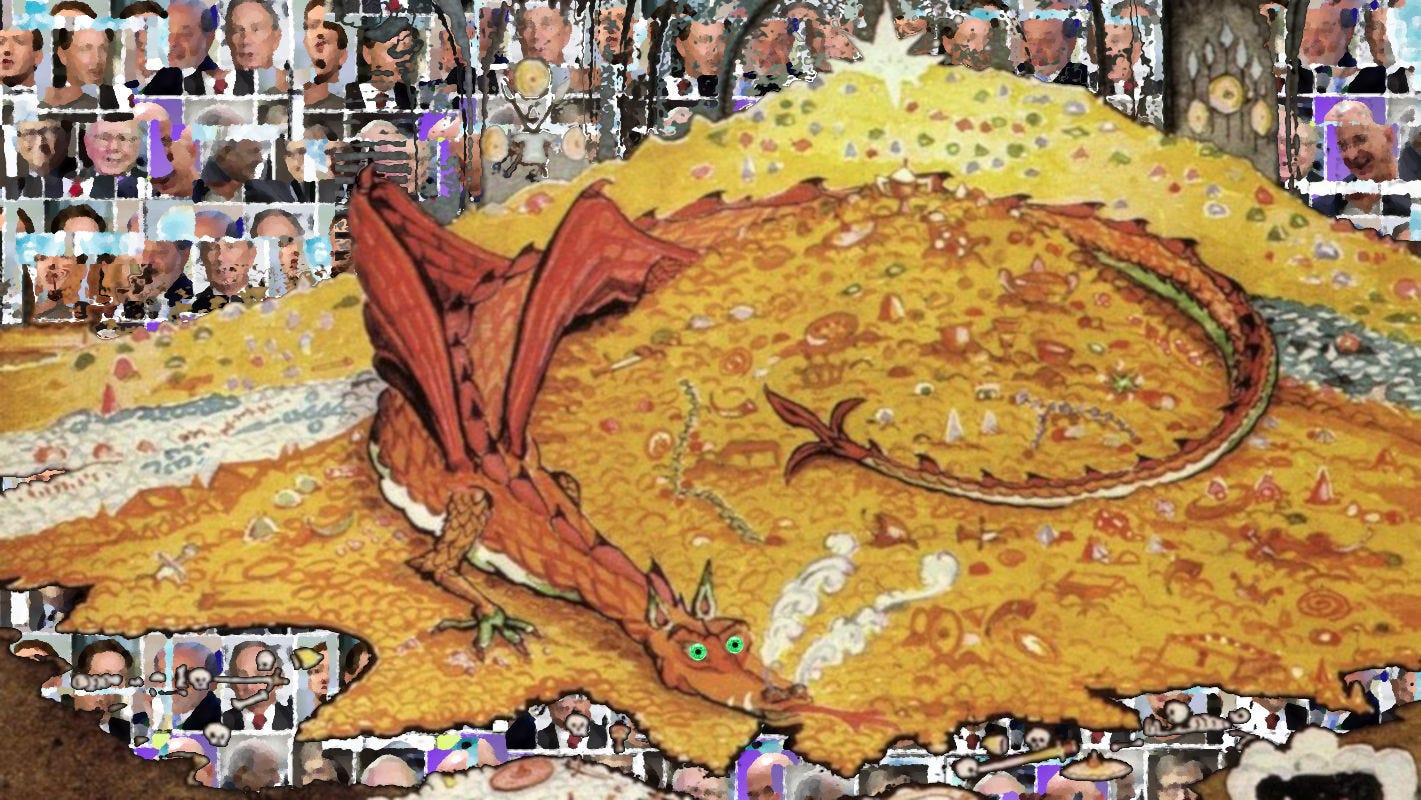A Cure for Dragon Sickness
Tolkien's metaphor for greed and today's billionaire dragon hoards
“The old Master had come to a bad end. Bard had given him much gold for the help of the Lake-people, but being of the kind that easily catches such disease he fell under the dragon-sickness, and took most of the gold and fled with it, and died of starvation in the Waste, deserted by his companions.” - J.R.R. Tolkien, The Hobbit
Tolkien’s legendarium is full of symbols and metaphors that are important to his purposes in having written the stories of Middle Earth. I personally consider The Hobbit to be his finest work, being far more tightly constructed than The Lord of the Rings, and vividly told, unlike his dryly recounted tales in The Silmarillion. It is that perfect kind of children’s story - the adventure tale that keeps young listeners rapt, while still offering great insights for those reading it aloud.
One of the key concepts in the later chapters of The Hobbit is dragon-sickness. The author introduces it gently by remarking that our titular hobbit, Bilbo Baggins, had failed to “reckon with the power that gold has upon which a dragon has long brooded, nor with dwarvish hearts.” Having won back their long lost kingdom beneath the Lonely Mountain, the leader of the dwarves, Thorin Oakenshield, becomes obsessed with the Arkenstone (another symbol) and determined not to share the vast hoard that the dragon Smaug has been brooding upon for over a century.
Dragon-sickness is simultaneous a magical illness, wrought by the dark powers of the dragons (who are expressly a creation of evil in this world), and a powerful metaphor for the greed unleashed by acquiring unimaginable wealth. It is dragon-sickness that brings about Thorin’s downfall by inciting the Battle of Five Armies, where great military forces converge upon the Lonely Mountain in their lust to seize the treasure hoard once its terrible guardian has fallen.
The Master of Laketown, Tolkien’s career politician, is also brought down by dragon-sickness. Laketown’s grim-faced hero Bard, has slain the dragon with aid from a thrush, who tells him of the dragon’s weak spot that Bilbo discovered through guile. When Bard eventually receives his rightful share of the hoard, he provides ample gold to the Master for rebuilding the dragonfire-devastated town. Yet the Master cannot resist taking the gold for himself and flees with it, whereupon he starves to death vainly trying to cross the wilderness with more gold than he can reasonably carry alone.
In our time, wealth has become so concentrated that the dragon hoards and those who brood upon them have become even more dangerous than Smaug was to Middle Earth. The wealthy do more than merely stockpile money in staggering amounts. Since the dawn of the twenty first century they engage in what is euphemistically called ‘effective altruism’. This confused philosophy encourages them to spend their money to bring about the ‘greatest good’ - which means, in practice, investing in those projects that can earn them yet more money while enforcing their own vain and foolish visions of ‘help’ upon our planet. The dragon-sickness is upon them, and they cannot ever see that the chief altruistic act the ultrawealthy might perform would be to scatter their hoard.
Thus the dragon-sick billionaires have become the enemies of both the financially independent and those imprisoned by the economic poverty that forcibly supplanted subsistence. Nations can try to intervene by siphoning off wealth or creating tariff ‘drag’ upon anyone funding action, but since nearly all governments can be bought off with sufficient dragon-gold, there is little hope that these problematic new wyrm-kin could be easily tamed on any national stage. Neither, I might add, is assassination a wise or effective defence. It is worth remembering that for Thorin and the dwarves, the death of Smaug was in no way the end of their troubles...
How can we cure dragon-sickness? We cannot. It is inherent to every great hoard that it corrupts those who claim it, a theme as ancient as mythology that takes upon newly darkened meanings for our time. The immense capacity for billionaires to inflict harm - even and especially when undertaking projects claimed to advance ‘the greater good’ - is amplified proportionally to the scale of their vast treasure piles, the grandest ever to have been hoarded. For nearly all humans become akin to dragons when corrupted by sufficient gold, and our sole defence against this sickness is whatever courage and honour remains kindled within our hearts.




They're already dead inside. Tough to pity them though.